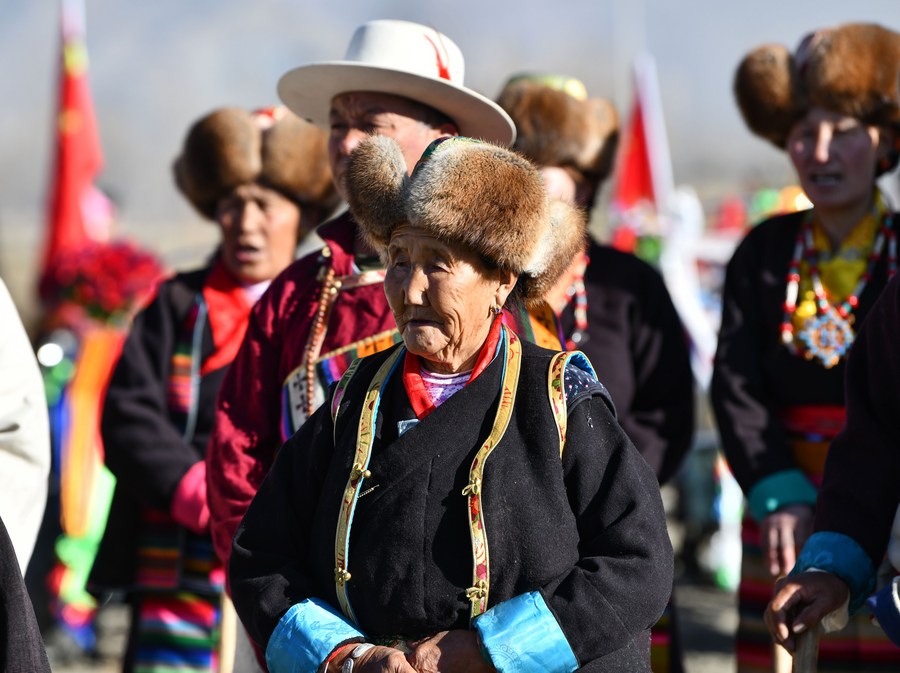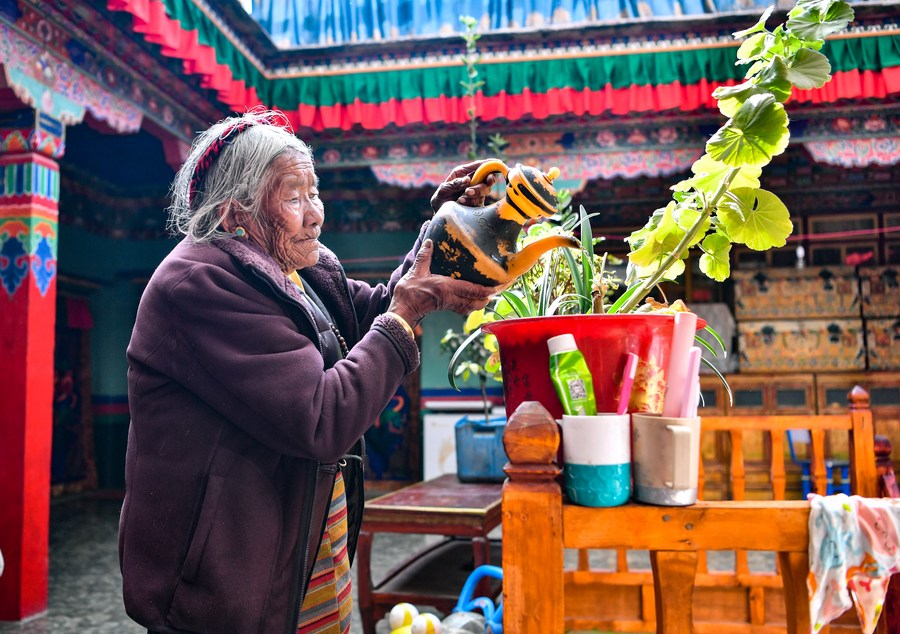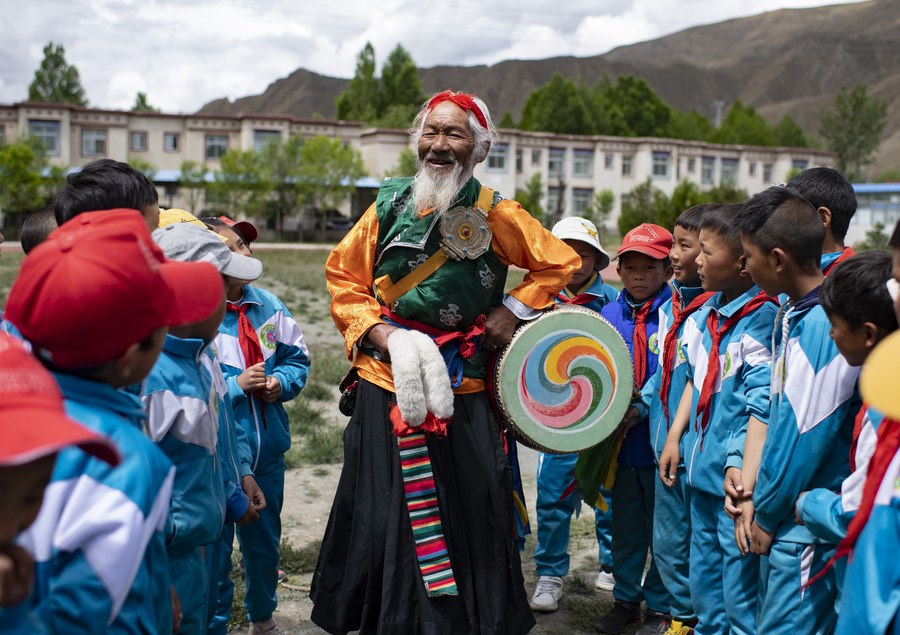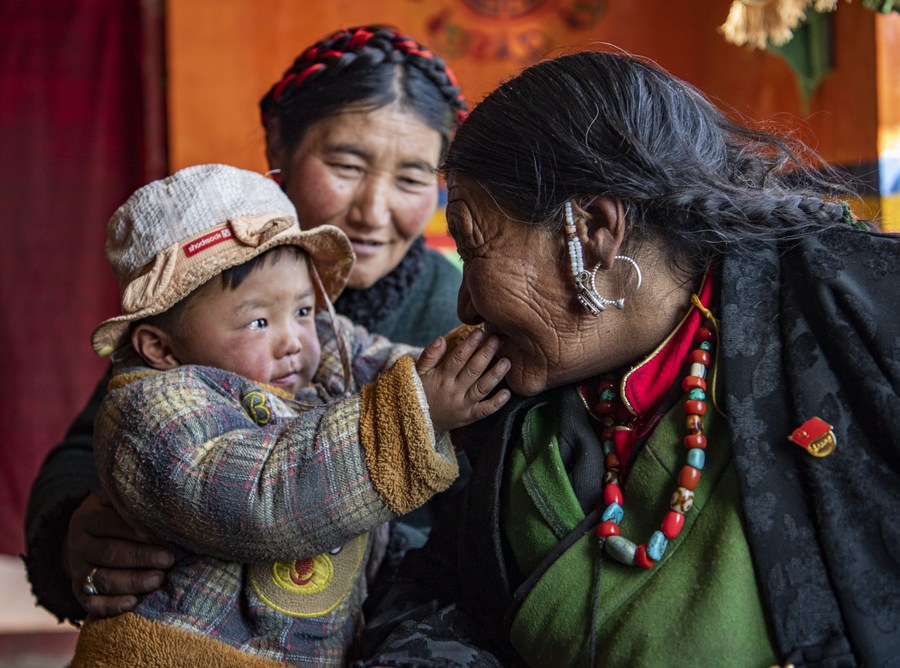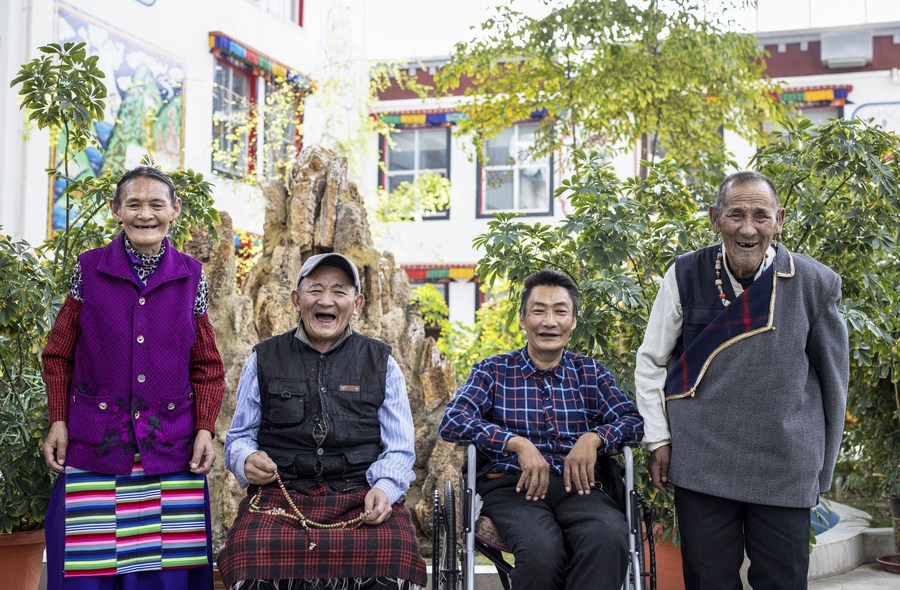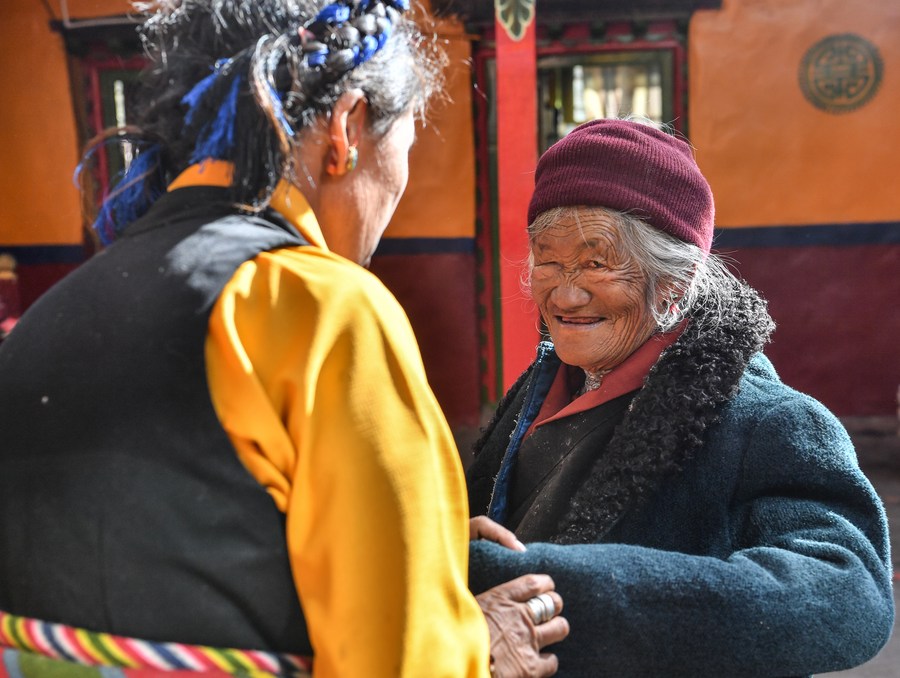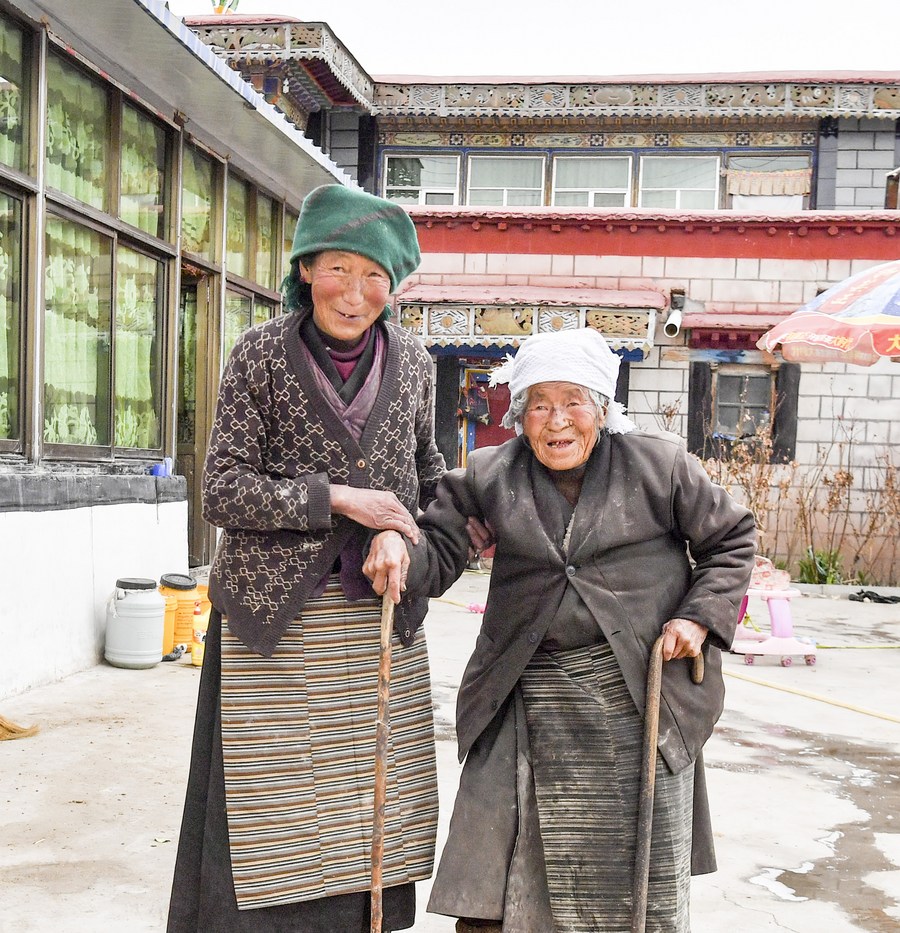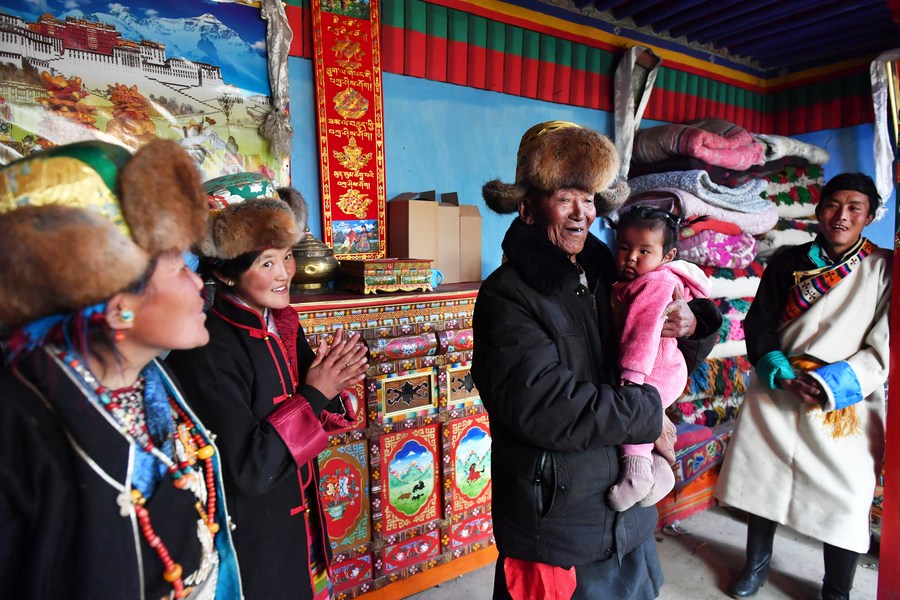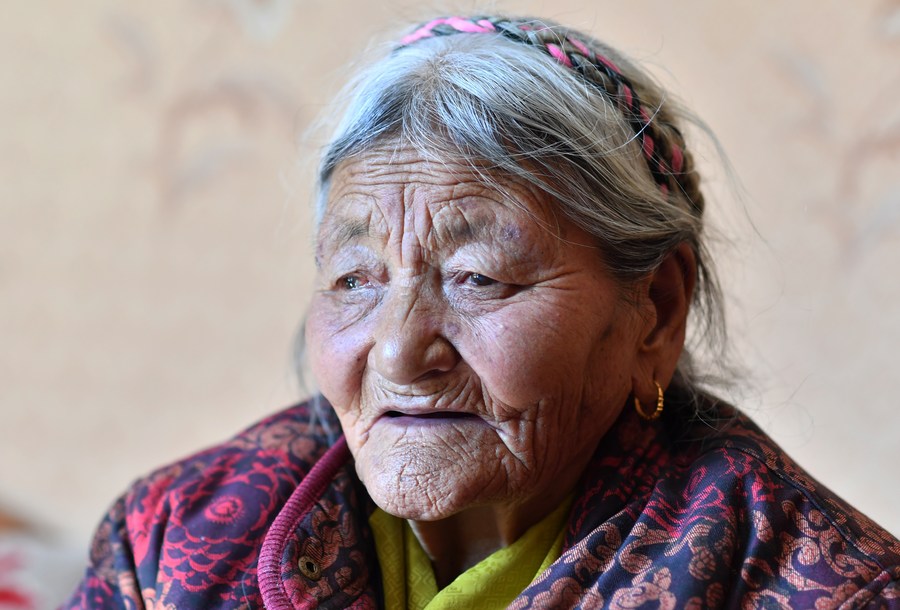LHASA, March 27 (Xinhua) -- On Sunday, Tibet will mark the 62nd anniversary of the democratic reform that abolished serfdom.
In 1959, the democratic reform completely obliterated the feudal serfdom of theocracy, changed the production relations of the old Tibet, smashed the shackles of feudal spirit and culture and freed local people from feudal political oppression.
Xinhua photographers focused their cameras on ten elders who used to be serfs in old Tibet. The former serfs' stories reflected Tibet's development over the past 62 years since the democratic reform.
Click the photos below for more stories
Dawa attends a ceremony marking the start of the spring ploughing in Kesum Community of Shannan City, southwest China's Tibet Autonomous Region, March 16, 2021. (Xinhua/Purbu Zhaxi)
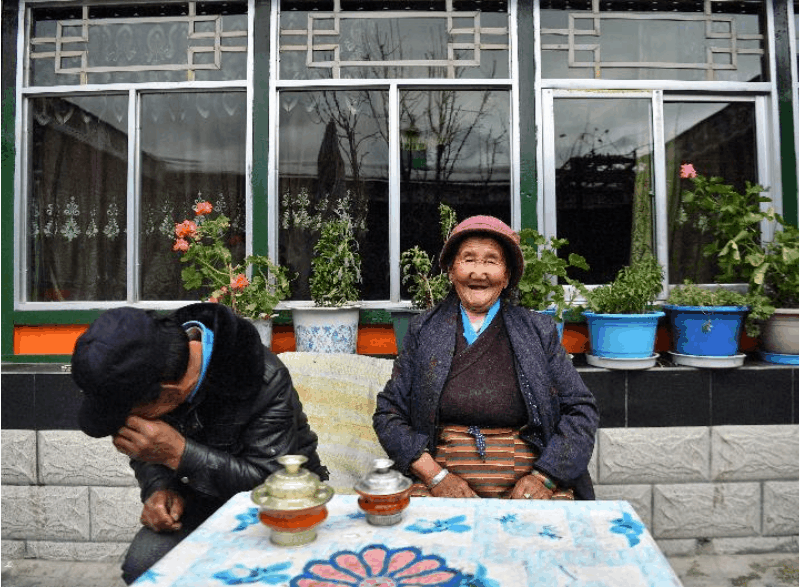
Dawa, 84, a former serf of Kesum manor in old Tibet, has experienced great changes in her life. "When I was a serf, I had to work day and night with little food and no human rights at all," Dawa recalled.
Now she lives in a well-furnished traditional Tibetan style courtyard in Kesum community, a forerunner in the region's democratic reform, and enjoys her old-age life with her family. "I wish I could live longer to see more development in Tibet," Dawa added.
Drungtok waters plants at home in Xigaze, southwest China's Tibet Autonomous Region, Jan. 15, 2021. (Xinhua/Jigme Dorje)
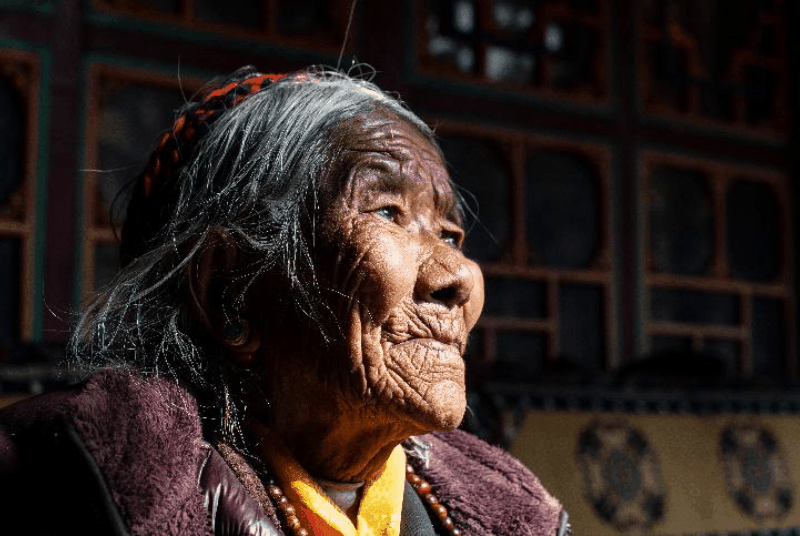
Drungtok, a former serf of Bailug manor in old Tibet, has seen her life totally changed from before. In the old days, Drungtok and her ancestors worked as serfs at the Bailug manor, making barley wine for the manor owner to offset the duty. She offered her labor all year long but never drank the wine herself. Nowadays, she lives in a Tibetan yard with her grandchildren, drinking barley wine and enjoying time with family.
Nyima prepares before Zhuo dance performance at a primary school in Qonggyai County in Shannan, southwest China's Tibet Autonomous Region, July 2, 2020. (Xinhua/Purbu Zhaxi)
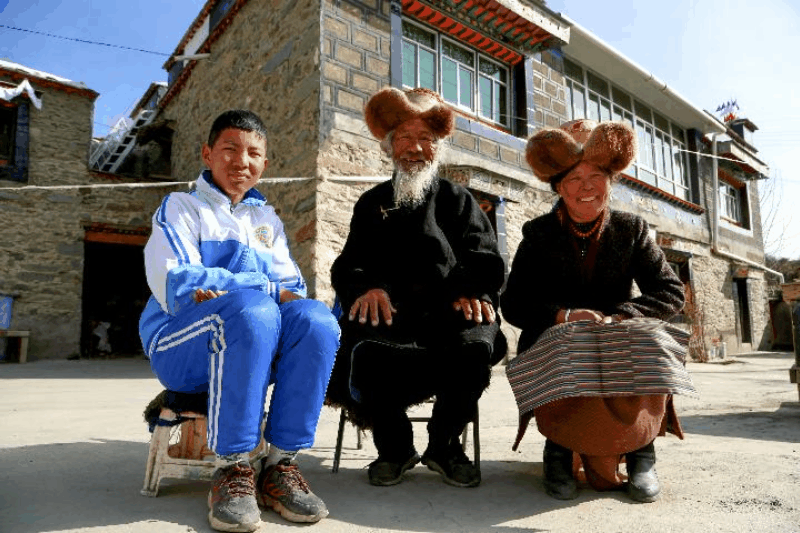
The 76-year-old Nyima, an inheritor of Jiuhe Zhuo dance, which is a national intangible cultural heritage now, began to learn the dance from his father at the age of nine.
Now, Nyima lives with his offspring at a new Tibetan house. After decades of studying, he has formed a unique dancing style and once won a national award for folk arts. Nyima taught his grandson Cering Toinzhub the Zhuo dance, trained dozens of apprentices and formed a Zhuo dance performing team in Jiuhe Village. He hopes the traditional folk art will be inherited and promoted.
Photo taken on Feb. 27, 2021 shows Basang (2nd L) posing for photos with her family at home in Ngamring County of Xigaze, southwest China's Tibet Autonomous Region. (Xinhua/Sun Fei)
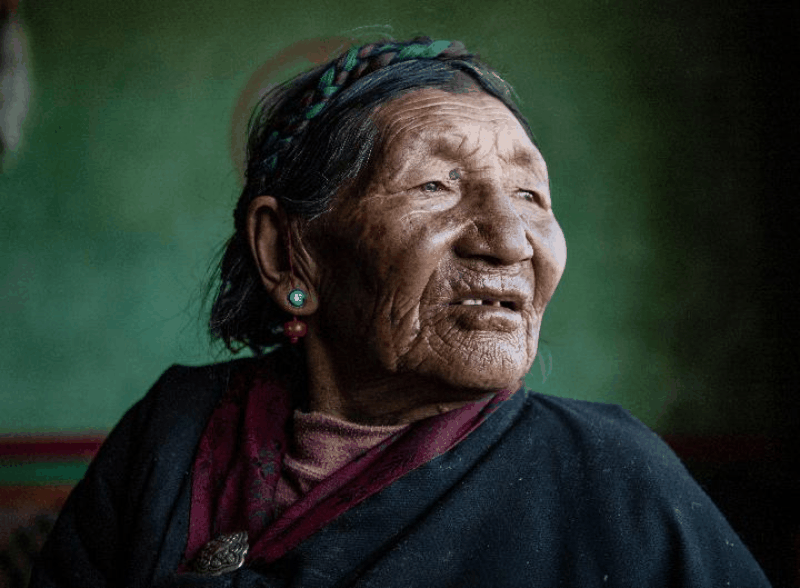
Basang, born in 1936, used to graze sheep for a serf owner to beg for a living before the democratic reform in 1959.
She had to pay wool and milk to the serf owner as a tax, and could not have enough food and clothes. "Winter was the most difficult season. There were eight people in my family, but we didn't have one pair of shoes. Grazing sheep and doing farm work barefoot, I really envy animals with hooves," Basang said with emotion.
Now, everything has changed. Basang enjoys her peaceful life in her spacious Tibetan-style house.
Tenzin Tsomo interacts with her granddaughter in southwest China's Tibet Autonomous Region on Feb. 25, 2021. (Xinhua/Sun Fei)
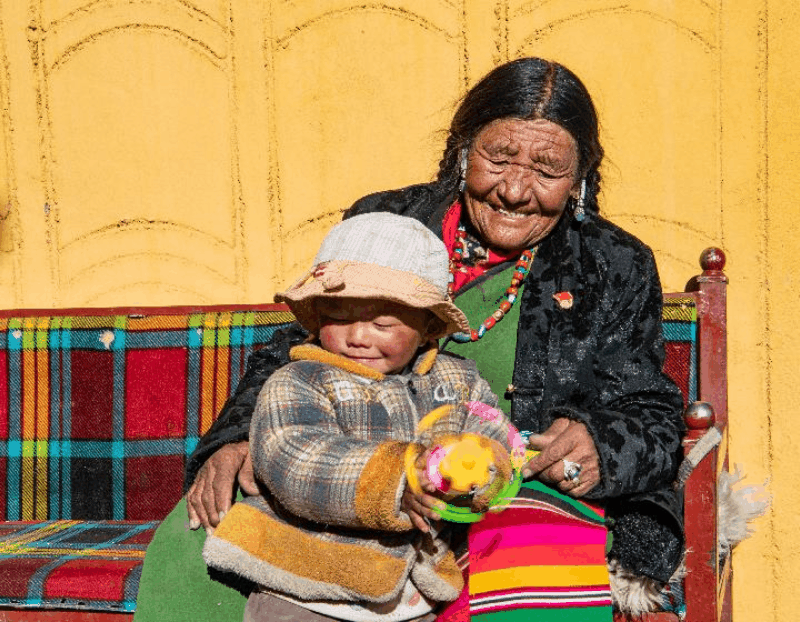
Tenzin Tsomo, born in 1942, is a villager in Zhuobabu Village of Saga County in Xigaze, Tibet Autonomous Region.
When Tenzin Tsomo was a child, her family had to graze sheep for serf owner while begging for a living. Driven to despair, they stole the sheep of serf owner and ran away. It was not long before the serf owner caught them back. Tenzin Tsomo's father was beaten into disabled. Their tent was taken away, so the family had to live in a cave.
Tenzin Tsomo's life has undergone tremendous changes since the democratic reform that started in 1959. She got married to a local official of Tibetan ethnic group, who worked at the village. Influenced by her husband, Tenzin Tsomo applied to become a volunteer and participated in the policy publicizing. In 1962, she joined the Communist Party of China.
Nowadays, Tenzin Tsomo's family keep their own livestock. In 2020, the family moved into a new house funded by the government.
Cedain (1st R) poses for a group photo with his friends at a care center in Ngari Prefecture, southwest China's Tibet Autonomous Region, March 19, 2021. (Photo by Konchog Chosphel/Xinhua)
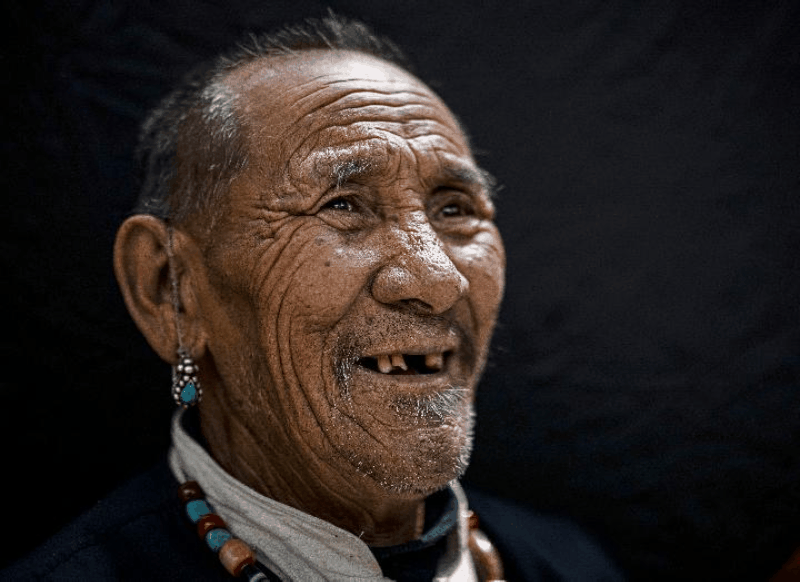
Cedain, born in 1941, is a villager of Qianjin Village of Gar County, Ngari Prefecture, Tibet Autonomous Region.
Without farmland and enough food, the former serf and his family lived on begging in the old times.
After the democratic reform in 1959, Cedain's family was granted farmland to grow crops and began to feed livestock, living a normal life with their own efforts.
Now Cedain enjoys the comfort in his old age at the care center in Ngari Prefecture.
Phentok stays with her daughter at Taba Village in Xigaze, southwest China's Tibet Autonomous Region, Jan. 15, 2021. (Xinhua/Sun Fei)
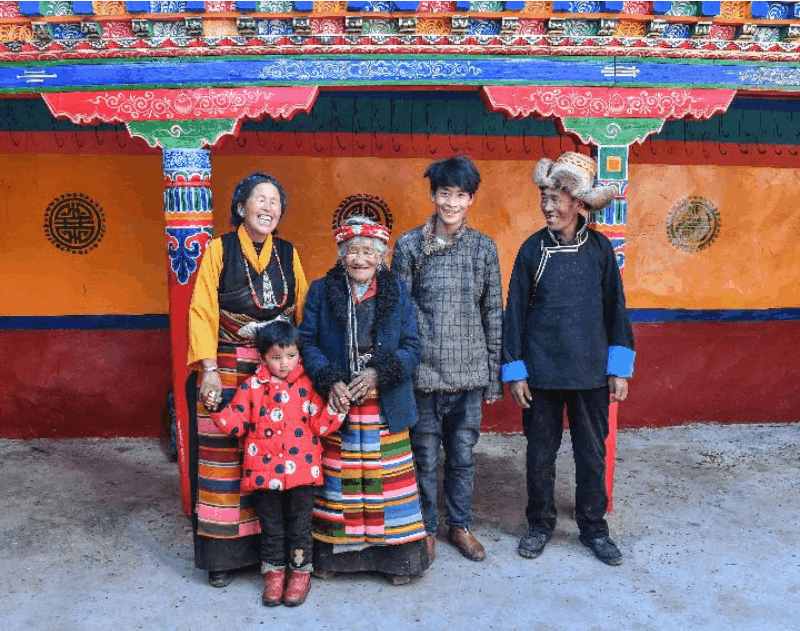
Phentok, born in 1941, is a villager of Taba Village in Xigaze, China's Tibet Autonomous Region.
In the old times, the former serf wore worn-out clothes and had no quilt to warm herself in winter times. Recalling her life in the old times, Phentok said that it was too wretched.
After the democratic reform in 1959, Phentok's family was granted farmland to grow crops and began to feed livestock, living a warm life with their own hands.
Drolkar (R) poses for a photo with her daughter in front of their house in Qugaqiang Village of Lhunzhub County, Lhasa, southwest China's Tibet Autonomous Region, March 22, 2021. (Xinhua/Jigme Dorje)
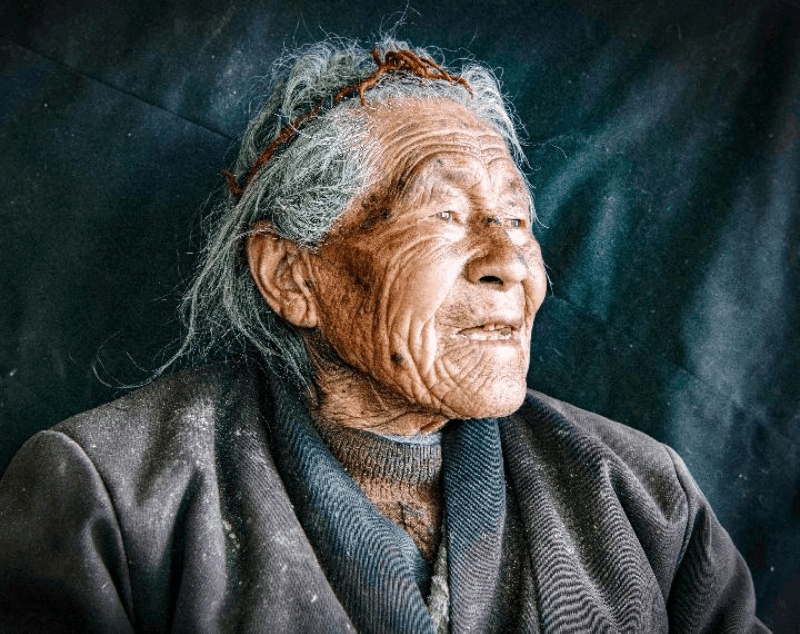
Drolkar, born in 1927, is a villager in Qugaqiang Village of Lhunzhub County, Lhasa.
In old Tibet, Drolkar had to go to Lhasa to carry stones for building. "Every time, the serf owner would stamp my forehead and arms as proof. Sometimes my forehead and arms were full of seals after work," Drolkar said.
"We were told to sing while working at the construction site. When we were too hungry to sing, the serf owner would beat us with sticks," she said.
After the democratic reform, Drolkar's family was granted farmland to grow crops and began to feed livestock, living a warm life with their own hands.
Nowadays, local government provides health subsidies to the elderly in Lhasa. Drolkar can receive an annual subsidy of 2,400 yuan (about 368 U.S. dollars).
Basang (C) talks with his family at his home in Taye Village of Xigaze, southwest China's Tibet Autonomous Region, March 21, 2021. (Xinhua/Sun Ruibo)
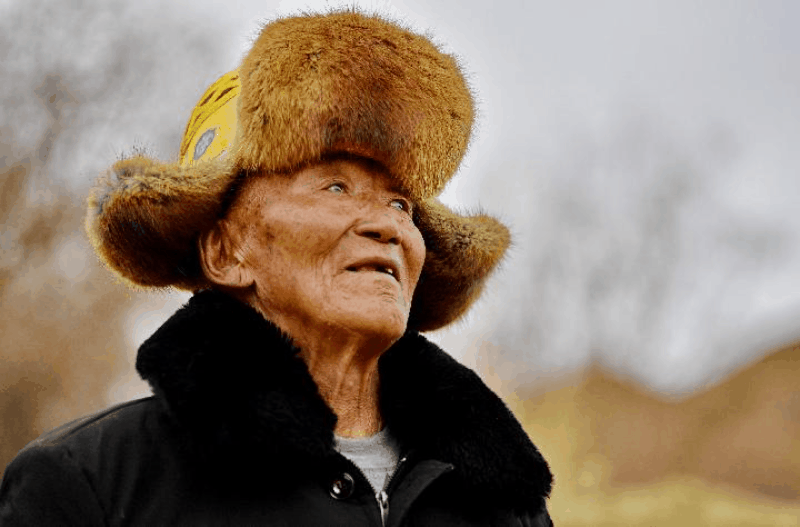
Basang, born in 1934, is a villager of Taye Village in Xigaze, China's Tibet Autonomous Region.
In the old times, the family of Basang had to pay various taxes to serf owners, which made the family lead a miserable life. "The number of taxes we paid was even more than ripples in the water and stars in the sky," recalled Basang.
Nowadays, Basang lives with his children and grandchildren. "I hope that my personal experience can deliver more people about the sufferings of the old Tibet and how lucky we are having a happy life today," he says.
Photo taken on Feb. 10, 2021 shows a portrait of Cering Lhamo at Zedang Township of Shannan City, southwest China's Tibet Autonomous Region. (Xinhua/Chogo)
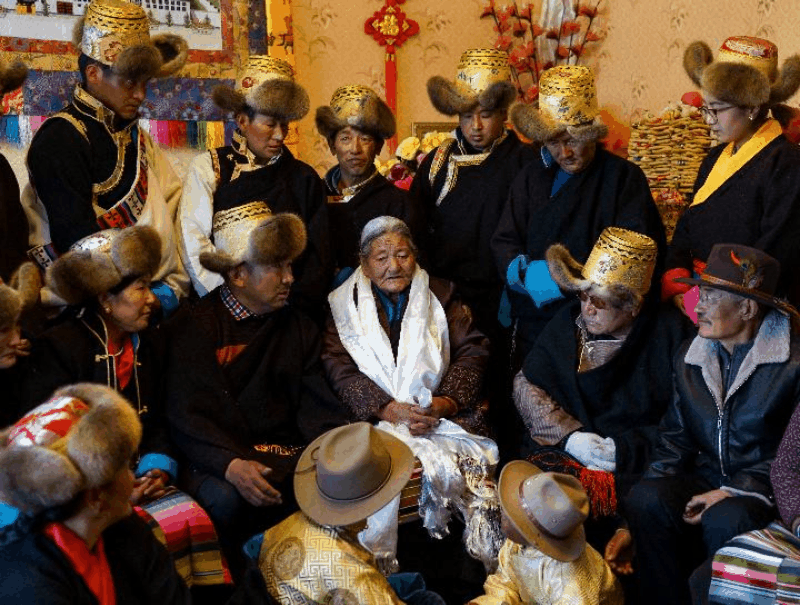
Cering Lhamo, 95, was born in a shabby cowshed in Lhunze County of Tibet Autonomous Region. She became a serf for a lord at the age of 6, and was forced to leave her parents and go to another manor at 12, as serfs could be sold or sent to other lords at will in the old times.
After the democratic reform in 1959, Cering Lhamo's three-member family was granted house, farmland and sheep, living a normal life. Cering Lhamo worked hard and organized a group among villagers to help each other in farmwork. In the 1970s and 1980s, she was awarded the honor of national model worker and labor heroine and elected as a deputy to the National People's Congress for two consecutive terms.
Now Cering Lhamo lives with her daughter and enjoys her old age at Zedang Township of Shannan City in Tibet.





